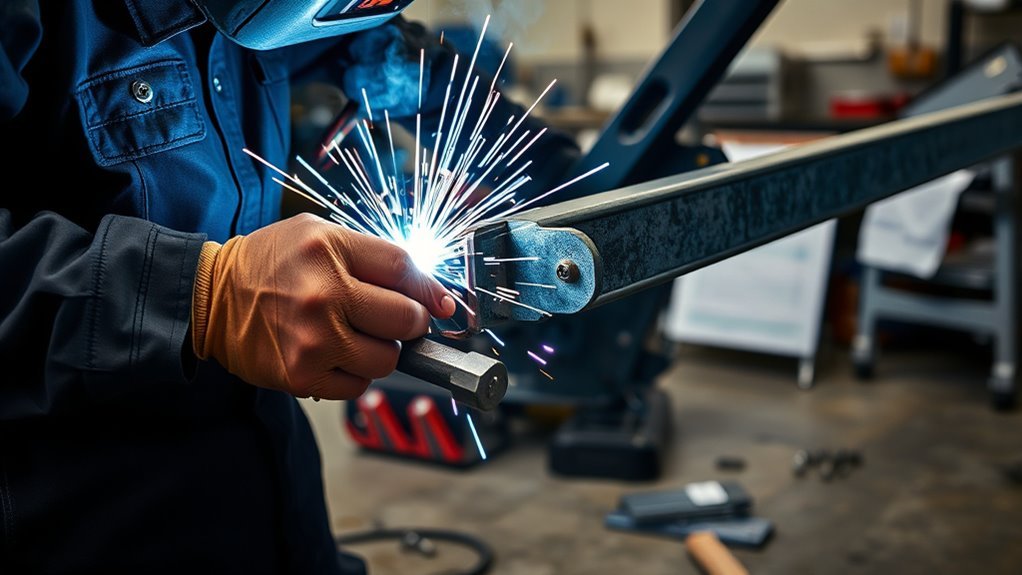Expect to pay roughly $50–$200 for small auto welds, $200–$500 for medium repairs, and $500 to $2,000+ for large or structural work depending on material and technique. Harder metals, thicker panels, and aluminum cost more because they need different processes and consumables. Labor usually runs $50–$150/hour and certified welders charge premium rates for safety-critical joins. Get itemized estimates and multiple quotes, and keep reading to learn practical ways to lower costs without cutting quality.
Typical Price Ranges for Common Auto Welding Jobs

When you’re budgeting for auto welding, expect small repairs like patching a bracket or weld-on tabs to run about $50–$200. Medium jobs such as fixing cracked components to cost $200–$500, and large structural work to start around $500 and climb past $2,000 depending on scope.
You’ll want to discuss material specifics and repair techniques with the shop so they can match welding equipment and filler metals to the substrate. Small jobs often use MIG tack and plug welds; medium jobs may require preheat, grinding, and stitch welds; large structural work needs certified procedures and heavier equipment.
Ask for an itemized estimate showing labor hours, parts, and any rush fees so you can compare quotes precisely.
Factors That Drive Welding Costs
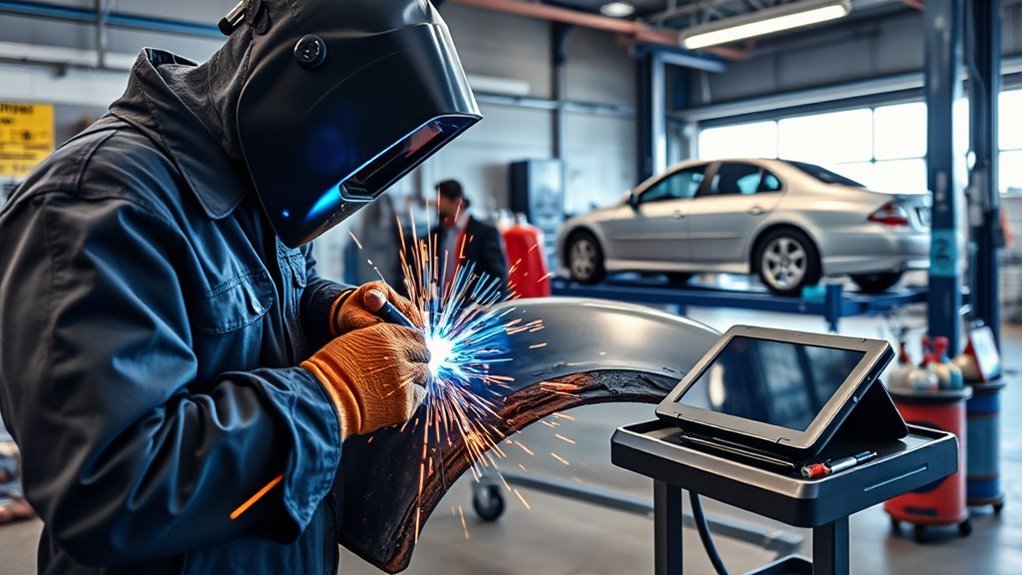
You’ll pay more when the material is harder to weld or thicker — aluminum and specialty alloys cost more than mild steel and need different techniques.
Expect labor charges to rise with repair complexity and time on the job, typically $50–$150 per hour depending on experience and location.
Combine material needs and labor hours and you’ll see why simple fixes can be under $100 while complex structural work can top $500–$2,000.
Material Type and Thickness
The metal you choose and its thickness are among the biggest drivers of welding cost, since different alloys and gauges need different techniques, consumables, and time. You’ll pay least for mild steel; aluminum and specialty metals require specialized welding techniques and pricier consumables because their metal properties demand different heat control and shielding.
Thicker sections mean more passes, higher filler usage, possible preheating, and heavier equipment, so material alone raises cost even before labor. Consumable rates change by metal—aluminum rods and specific gases cost more—so project scale matters.
While geographic pricing varies, focus first on matching technique and consumables to metal properties and thickness to predict material-driven cost changes accurately.
Labor Time and Complexity
Although material and technique set the baseline, labor time and job complexity are what really determine your final bill: welders charge roughly $65–$125 per hour depending on skill and location, and a simple patch can cost under $100 while medium to large repairs commonly run $200–$2,000+ as joints, access, and fit-up demand more hours.
You’ll pay for time spent disassembling, cleaning, and fixturing; TIG on aluminum takes longer than MIG on steel. Urban rates raise hourly costs and travel or staging add flat fees.
Post-weld grinding, coatings, and inspections extend project duration and raise totals. Prioritize shops that track labor efficiency and give hour estimates tied to specific materials and processes so you can compare quotes precisely.
Comparing Welding Processes: MIG, TIG, Stick, and Flux‑Cored
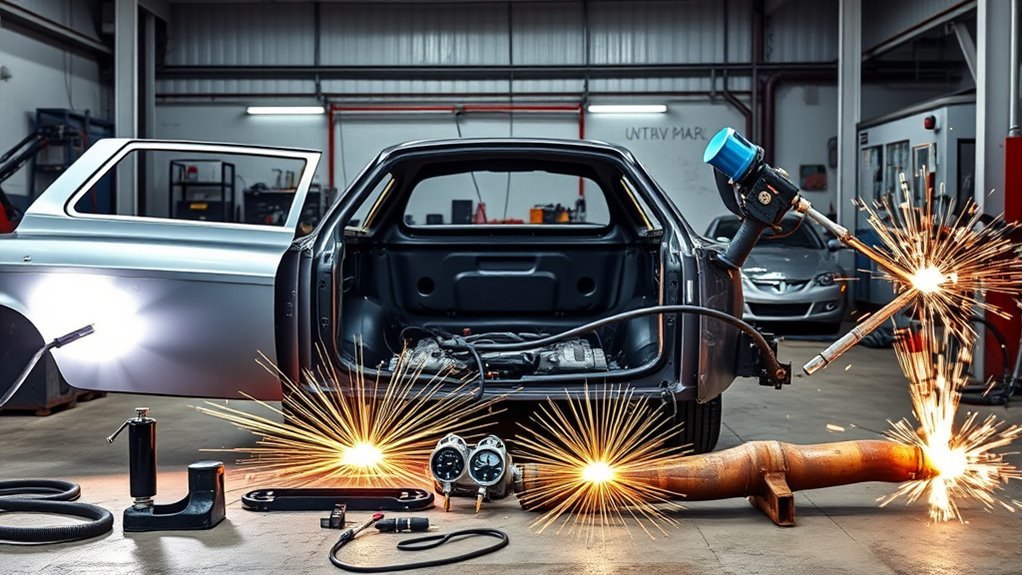
When comparing welding methods for car repairs, pick the process that matches the metal thickness and repair scale to control labor and material costs.
You’ll weigh welding advantages and process comparisons: MIG gives fast, versatile deposition for thicker panels and large repairs, so labor hours drop and per-job cost stays low.
TIG delivers precise, clean welds for thin sections but runs slower and needs higher skill, increasing labor rates.
Stick works outdoors and on dirty or thick parts, offering moderate cost and robustness for heavy-duty fixes.
Flux-Cored (FCAW) yields high deposition for structural work, cutting time but raising material expenses because specific wire is required.
Choose by thickness, access, finish needs, and how those factors affect time and consumables.
Material Type and Its Impact on the Bill
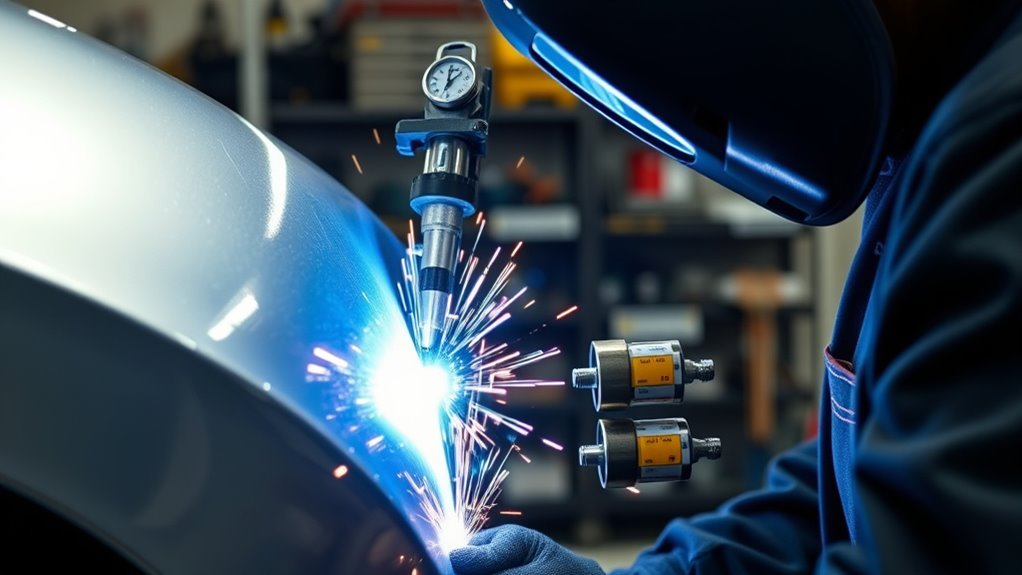
After you’ve matched the welding process to panel thickness and repair scope, you need to factor the metal itself—because material choice directly changes parts, labor techniques, and the final bill.
You’ll pay less for standard steel: material is cheap, welds are faster, and common MIG setups handle thicker sections economically.
You’ll save money with standard steel—cheaper material, quicker welds, and standard MIG setups handle thicker sections efficiently
Aluminum costs rise because aluminum needs different filler, cleaner surfaces, and often TIG or specialized MIG torches; that boosts labor time and consumable expense.
Thicker panels of any metal increase hours and require higher heat input or backing, upping cost.
Custom shapes and intricate joints add material waste and skilled time.
Specialty metals and exotic alloys command premium pricing and specialized procedures, so expect a notable uptick in both parts and labor.
DIY Vs Professional Welding: Cost Tradeoffs
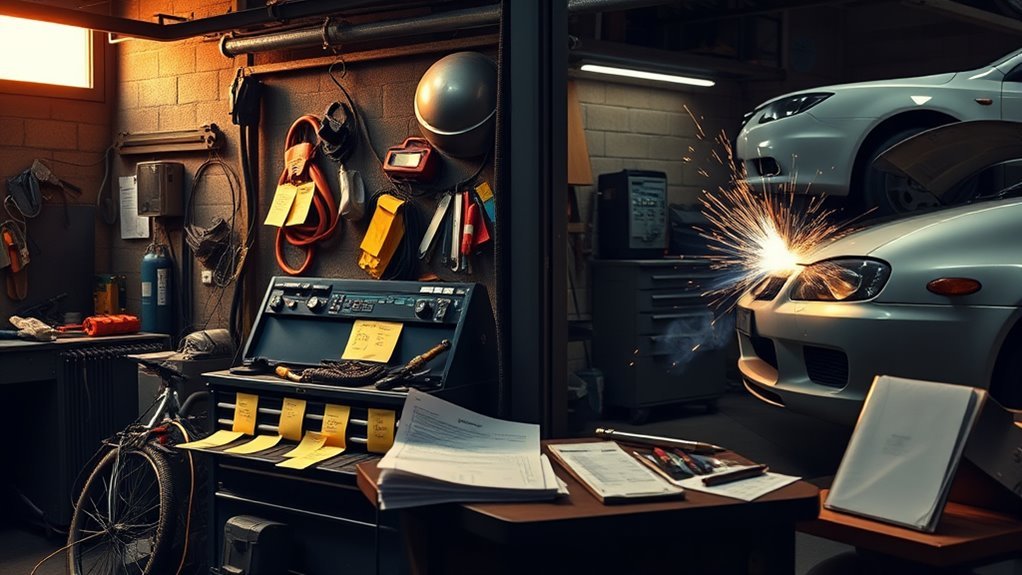
You can save on small jobs by doing basic welding yourself, since a personal welder and consumables often cost less than repeated shop rates.
But pro welders bring consistent weld quality, proper equipment, and project pricing that typically ranges $124–$486, which protects critical repairs from costly rework.
Weigh upfront DIY savings against the pros’ expertise and included materials when the part’s safety or longevity matters.
DIY Upfront Savings
Many DIYers save hundreds by buying gear instead of paying a pro: hourly shop rates commonly run $65–$125, while basic repairs you can tackle yourself often cost under $100 in materials and consumables.
If you plan multiple jobs, a quality welder (around $3,000) amortizes quickly versus repeated shop visits. Factor welding safety kit costs, shielding gas or wire, and consumables into your upfront total.
You’ll also need to budget time for learning and potential rework if technique slips. Routine equipment maintenance—cleaning tips, replacing nozzles, checking leads—keeps costs down and performance consistent.
Use free online tutorials and local classes to shorten the learning curve, and track parts and hours so your DIY savings remain real and measurable.
Pros of Pro-Welders
If you’ve weighed the upfront savings of buying gear, it’s worth looking at why hiring a pro often makes financial sense for certain jobs.
You’ll pay $65–$125 per hour, but you get expert techniques honed by training and experience; that matters when structural integrity or safety is involved. Pros diagnose hidden damage, choose proper filler and shielding gas, and execute welds that resist fatigue.
For simple patches you might save with DIY materials costing $30–$50, yet complex repairs can exceed $2,000 if not done right. By investing in a professional you gain quality assurance that reduces repeat repairs and long-term costs.
Choose pro work for critical joints; save DIY for nonstructural, low-risk jobs.
How to Get Accurate Local Quotes and Estimates
Start by describing the repair in precise detail: state the metal type, the welding process required (MIG, TIG, or stick), exact locations and sizes of the cracks or rust-through, and any access or prep work needed so shops can give realistic bids.
Include concerns about welding safety and note if parts must be removed or isolated.
Contact several local shops to compare rates—expect $50–$150 hourly—and ask for line-item breakdowns: labor, materials, prep, and disposal.
Give measurements and photos so estimates match reality. For small jobs expect $50–$200, medium $200–$500, large jobs over $500.
Use written quotes, check credentials and warranties, and be ready to enter quote negotiation if scope or materials differ between bids.
Tips to Reduce Welding Expenses Without Sacrificing Quality
When you prepare and fit panels, clear rust, and mark exact weld locations before the welder arrives, you’ll cut shop labor and hourly charges considerably.
You can adopt a mix of welding techniques and cost saving strategies: learn MIG basics to handle small repairs yourself if you have the right tools and safety gear, and invest in a reliable welder to lower future shop dependency.
Get multiple quotes—rates range roughly $50–$150/hour—so you can compare labor versus DIY tradeoffs.
Network in local welding forums or clubs to find lower-rate pros or skill swaps.
Prioritize tasks you can prep (fitment, cleaning, measurements) and reserve certified welders for structural joins to keep quality high while trimming overall expense.
Frequently Asked Questions
Can Welding Repairs Affect a Vehicle’s Resale Value?
Yes — welding repairs can lower resale value if repair quality is poor; you’ll preserve value by using proper materials, certified welders, documented work, and corrosion protection so buyers see structural integrity and honest maintenance.
Do Welding Jobs Come With Warranties or Guarantees?
Like a mechanic’s handshake, yes — you’ll usually get warranty terms or repair guarantees; one shop even tracked weld longevity for five years, so you’ll know coverage length, material limits, and what’s excluded before work starts.
How Long Does a Typical Automotive Welding Repair Take?
You’ll typically finish a minor automotive welding repair in one to three hours; more complex jobs take several days. You’ll use specific welding techniques and repair materials, and you’ll plan time for fit-up, welding, and finishing.
Can Welding Cause Electrical Issues or Damage Sensors?
Sparks, shorts, smoke — yes, welding can cause electrical issues and damage sensors. You’ll use proper welding techniques, ground carefully, and apply sensor protection like shielding and disconnects to prevent harm and guarantee material integrity.
Are There Environmental or Safety Regulations for Car Welding Waste?
Yes — you must follow environmental regulations for welding waste; you’ll manage and dispose of slag, metal filings, solvents, and contaminated rags per local rules, use proper ventilation, PPE, and hazardous-waste protocols to prevent contamination.
Conclusion
You’ve seen typical prices, key cost drivers, and process differences — but before you decide, remember one thing: the cheapest quote often hides compromises. Think about metal type, access, and required finish; those silently inflate bills. If you’re tempted to DIY, weigh time, tools, and safety against a pro’s warranty. Get three local estimates, inspect past work, and you’ll dodge costly surprises — and finally know the real value of the repair.

